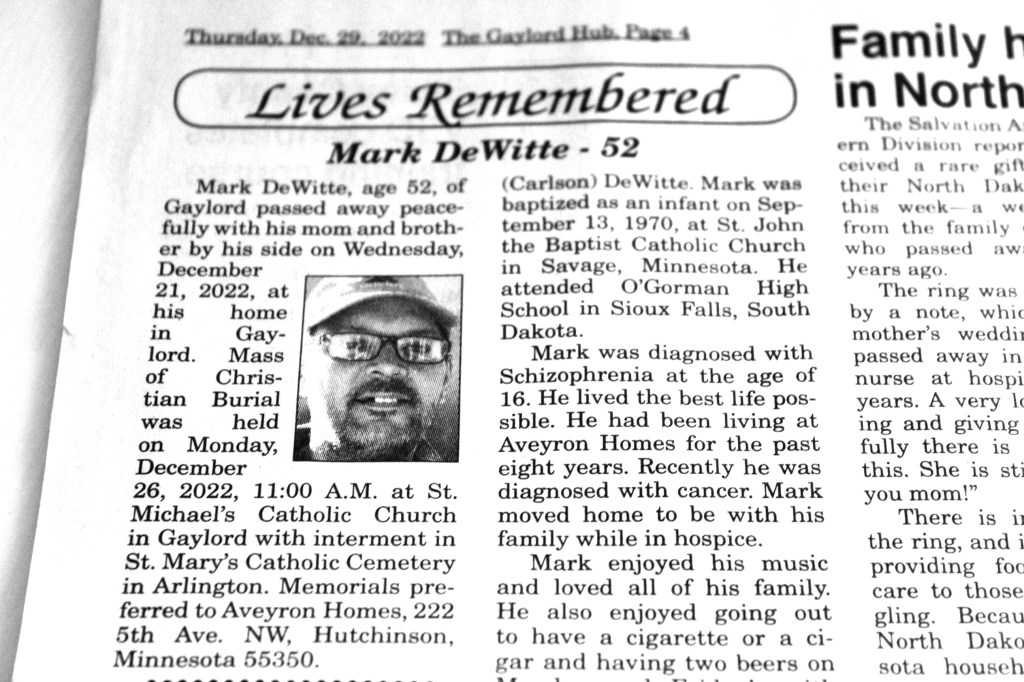
HE LIVED THE BEST LIFE POSSIBLE.
That statement in the obituary of a 52-year-old Gaylord man may not seem extraordinary. He died on December 21, 2022, of cancer. But nowhere in Mark DeWitte’s obit does it state that he died after a courageous battle with cancer as is commonly seen in death notices. The only references are to a recent diagnosis and a move home to be with his family while in hospice.
Rather, the health diagnosis which led to that living the best life possible assessment is schizophrenia. Mark was diagnosed at the age of 16, which means he lived with this awful, debilitating brain disorder for 36 years.
DISPELLING THE MYTHS
That Mark’s loving family chose to publicly reveal his schizophrenia in print speaks to the depth of their love, their support and their courage. The misunderstandings attached to this disease all too often create fear and stigma, adding to the challenges of what is already an overwhelming health condition. Visions of violence, split personalities and other negative behaviors too often color schizophrenia with untruths. The National Alliance on Mental Illness defines schizophrenia as “a serious mental illness that interferes with a person’s ability to think clearly, manage emotions, make decisions and relate to others. It is a complex and long-term medical illness.” (I encourage you to read more details about schizophrenia on the NAMI website by clicking here.)
It should be noted that schizophrenia manifests differently in individuals and, although incurable, can often be managed with medication, therapy and more. Managed. Not cured. It’s not easy, but it’s possible to live the best life possible. Mark clearly did that within the confines of his symptoms. But he didn’t do it alone. He had a family who loved him, a community that cared and professionals who supported him. For the past eight years, Mark lived at Aveyron Homes.
Mark’s obituary offers glimpses of what brought him joy: Music. Going out with his brother Mike for beer twice a week. But, most of all, his family brought him joy.
RIPPLING INTO THE FAMILY
Schizophrenia, like any other long-term health issue, affects the entire family. The DeWitte family acknowledges that, not in any specific statement but rather in their willingness to write about their loved one’s life-long disease. Too often, we fail to recognize or even acknowledge the challenges of a serious mental illness and how it affects those dealing with and touched by it. Generally, there are no meals delivered during a mental health crisis. No “how are you doing?” questions or offers of help. Minimal, if any, compassion. Rather, the reaction is often one of silence, as if not speaking about “it” negates the need to show care or attempt to understand. There are exceptions, of course, and we as a society are slowly shifting towards understanding and acknowledgment and reducing stigmas about mental illness. Still, mental illness remains mostly hidden.
BREAKING THE SILENCE
Mark’s family is breaking the silence via their openness about his schizophrenia. It’s clear from a follow-up public thank you published in their weekly newspaper, The Gaylord Hub, that the community supported them. Linda DeWitte (Mark’s mom) and Michael DeWitte thanked the community for food, cards, flowers, memorials and even for snow removal. I can only assume the community also supported them when Mark was alive.
That Mark lived the best life possible while living with a horrible horrible disease comforts me. His family may not have stated that he died after a courageous battle with schizophrenia. But in my eyes he did.
#
FYI: I encourage you to visit the National Alliance on Mental Illness website (click here) to learn more about mental health issues like schizophrenia, bipolar, depression, anxiety, post traumatic stress disorder and more. NAMI offers information, support and help, including online and in-person support groups. Check your state’s NAMI organization for specifics. NAMI is a valuable resource that can grow knowledge, compassion and understanding.
© Copyright 2023 Audrey Kletscher Helbling

Such an eye opening post. There are a few things in my life that a handbook would be a nice to have, however; thank goodness for resources readily available. Especially with family and friends that have/had mental illnesses as well as mental illnesses stemming from other medical conditions. I was raised that it was not openly talked about past the family/friend unit. I am glad it is now being more openly talked about. There are times in life when you need a 3rd party assistance to help deal with life (i.e., your own whole being health, family/friend with mental illness or medical illness, post partum depression, death/grief, being victimized, domestic violence, dementia/Alzheimer’s, etc.). It can be hard to navigate if you do not have the help and the resources you need. The people that serve in those roles are a true blessing. Take Care
Well summarized, Renee. I appreciate that you expanded on this topic.
What a beautiful essay.
Thank you, Michelle. And thank you for your openness about your eating disorder and recovery.
Bless you, Audrey. ❤ ❤
Awwww, Penny.
Thanks Audrey for sharing and encouraging many families and caregivers.
You are welcome, Virgil. This will always be part of my writing mission.
Very interesting…and grateful the family chose those words. They are powerful.
Every once in awhile I come across an obituary that is especially powerful. I am so thankful Mark lived the best life possible with his loving family to support him.
this is not only courageous, brave, and powerful, it is a gift to those affected by this horrible disease. may they see the normalization of mental illness and see it is important to talk about it, and there is a way to live in the best way possible.
I hope that, in some way, that happens. I feel gratitude to the DeWitte family for sharing about Mark’s brain disorder and that he led the best life possible. Such love in their words.